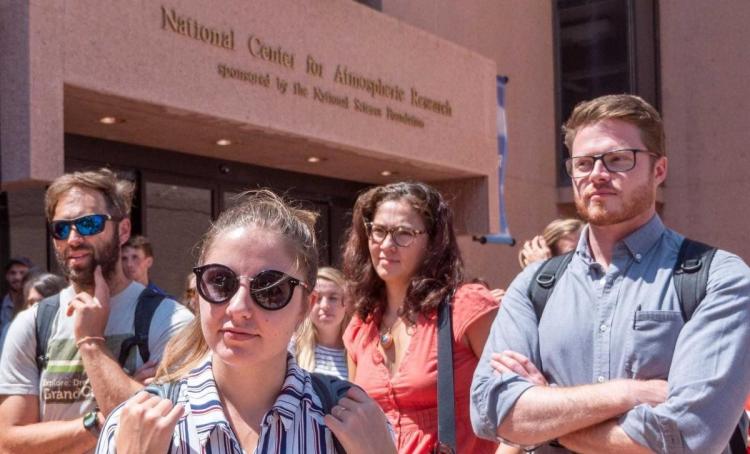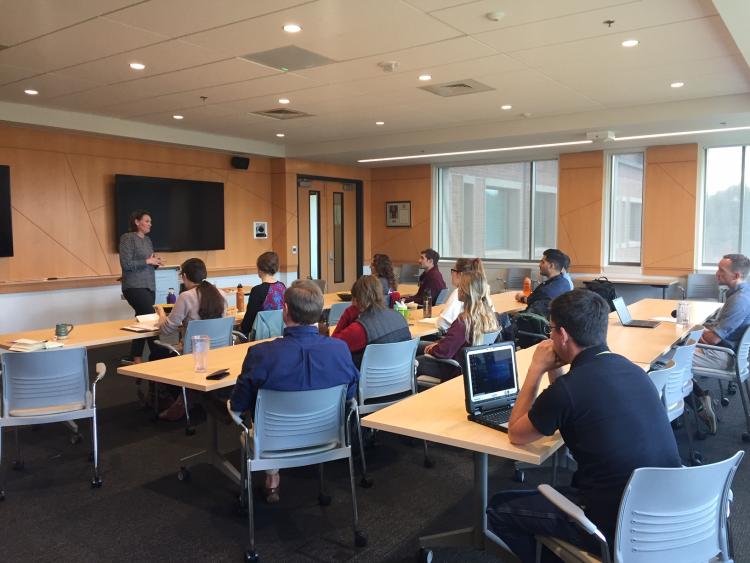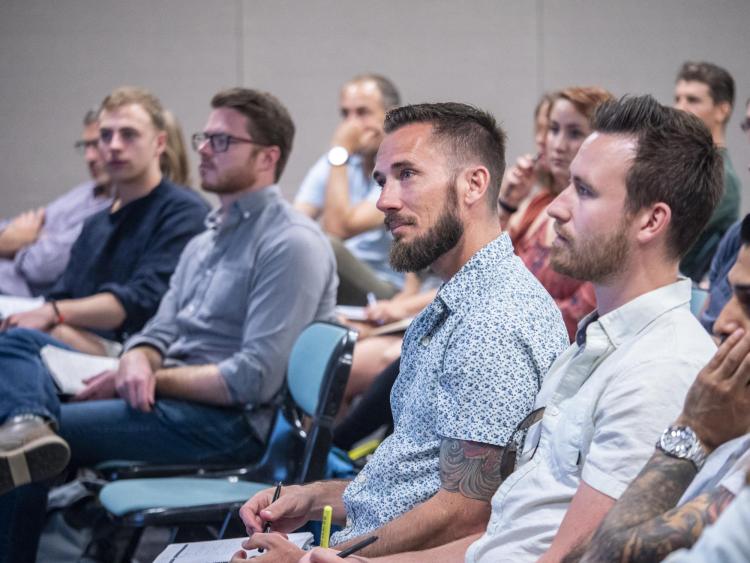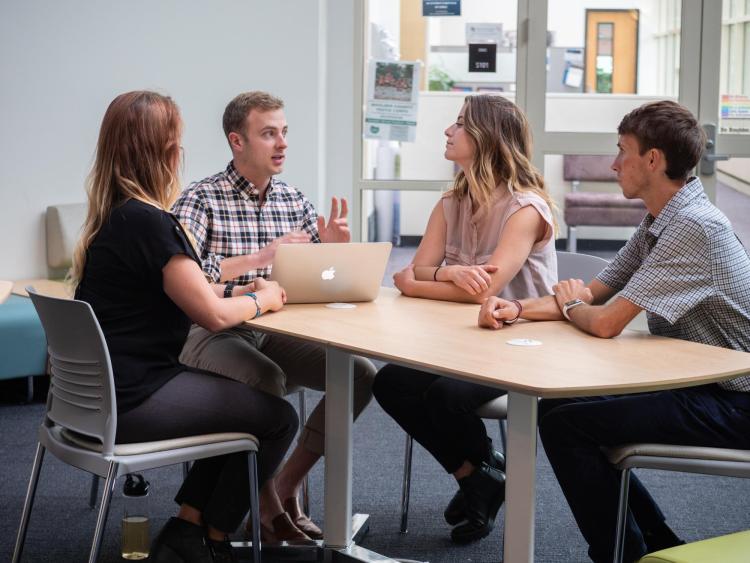Workshops, Seminars & Field Trips

The Masters of the Environment Graduate Program offers a series of workshops, seminars, and field trips to students throughout the year at no additional cost. These programs are meant to complement the classroom curriculum and help give students applied, hands-on experiences both on- and off-campus.
Workshops and seminars can range from technical to professional in scope, are often facilitated by leading practitioners and professionals in their respective industries.
Sampling of Past Workshops:
Becoming an Effective Meeting Facilitator: In this workshop, students will learn the basics of facilitation in order to assist organizations, teams and communities to agree on decisions, projects and initiatives. Participants will gain information on how to structure both in-person and virtual meetings in order to create engagement and build consensus. Strategies will be discussed to help prepare agendas, determine activities and exercises, and manage difficult situations.
- Define the role of a facilitator
- Learn five key preparation steps for facilitation
- Gain tips in developing agendas and managing time during facilitation
- Learn basic methodologies and facilitation formats to engage groups and build consensus both in-person and virtually
- Learn tips, strategies and activities to create participant engagement
- Understand best practices of managing group conversations
- Gain strategies in how to manage disruptions and difficult situations
- Get practice using the facilitation skills with your classmates
Communicating with Impact: Presence is a set of skills and qualities that instill confidence, and create strong connections with any audience, anytime, anywhere. It is the ability to build powerful relationships, credibility and trust by virtue of how you “show up.” Presence is crucial to credibility. Your opportunities, reputation, ability to be seen and heard as a leader - are all linked directly to your “presence.”
This session provides a model, tools, and strategies to enhance your presence, to be seen as a more credible, confident, and effective leader. Specifically, participants will be provided targeted practice and coaching to: (1) Balance competence and connection behaviors; and (2) Recognize his/her/their own presence strengths and gaps.

Crafting Your Resume: Join Rachel Bigby, MENV's resident Career Advisor for an interactive workshop on how to craft a resume that gets noticed. This virtual workshop will cover topics such as: types of resumes, key elements of a resume, do's and don'ts, how to write strong bullets, and tools and resources for creating your own resume, including multiple resume templates. Don't miss out on this opportunity to get a jumpstart on your professional development work prior to arriving on campus!
Effective Allyship: Allyship: Leading with collective work in mind. This session is designed to provide a roadmap for leading, working and serving with allyship in mind. The session will address tips, techniques, barriers, and future-thinking strategies to advance a system where collectiveness is the norm.
Greenhouse Gas Accounting: This workshop is the first in a two part series on greenhouse gas accounting, and focuses on establishing a baseline carbon emissions inventory. This workshop will begin with an introduction to the international standard for greenhouse gas accounting - The Greenhouse Gas Protocol - and its principles and requirements. We will then walk through assessing and calculating a baseline of carbon emissions for an organization or a household, that will include understanding the three scopes of carbon, setting organizational and operational boundaries, converting the Kyoto 6 greenhouse gases to carbon dioxide equivalents and more. Additionally, this workshop will focus on understanding carbon accounting, scopes, and household emissions and how to mitigate/offset them.
Once we have a greenhouse gas emission baseline for a facility or organization, we need to plan and forecast initiatives to reduce net emissions taking into account possible facilities or organizational growth over time. This workshop focuses on advanced skills in greenhouse gas accounting - forecasting and reduction - we will scale the concepts/practices from workshop one and review CU's emissions, operations, mitigation, and planning systems with Ellen Edwards.
Interviewing to Find Your Best Fit: Join this interactive workshop that helps you prepare to interview with confidence. We'll cover how to tell your best story and what information is vital to convey. You'll identify what questions you need to be asking as well as how to answer the questions you might be asked. And we'll look at the various forms of technology that are being used in today's interview process.

Introduction to GIS: All environmental issues of the 21st Century are complex, spanning multiple disciplines and multiple scales, and are all spatial—they have geographic patterns, relationships, and trends. Modern geotechnologies (Geographic Information Systems, Remote Sensing, GPS, and web mapping) can empower you to be a change agent in your future workplace, applying spatial thinking with skills in spatial analysis and geovisualization. These geotechnologies include crowdsource-able field apps, surveys, software-as-a-service mapping and analysis tools, multimedia story maps and other web mapping applications, data as services, and much more. Join geographer Joseph Kerski for a brief but deep immersion in how to use these tools to examine water quality, invasive species, climate, land cover change, natural hazards, energy, and many other issues.
Networking That Gets Results: When done well, networking is a powerful tool that can help you significantly advance your career. All too often people network without clear intentions and goals. In this workshop, we will cover:
- Defining your networking needs
- Tools for targeting the right connections
- What to expect out of different types of events
- How to effectively talk about yourself without boring people
- Asking for 1 on 1 meetings
- 30 minute meetings that build your network
- Asking for connections to people they know
- Follow up, follow up, follow up
Presentation Weapons and Tactics: The purpose of this workshop is to hone students’ professional presentation skills. The workshop can be broken down into the “techniques” portion and the “practice” portion. The techniques session consists of highlights of what makes a great presentation, and is done in an interactive format. These are all of the tricks and methods that can help the student design and deliver a great presentation. The practice is made up of each student doing presentations and getting reviewed. The goals of this workshop are to:
- Understand how to create & deliver an excellent presentation
- Build confidence in public speaking
- Practice delivering presentations in several contexts

Professional Writing and Communication: You know first impressions matter. You wouldn’t go to a job interview with a wrinkled shirt. But, especially in this internet-savvy world, our writing often precedes us. Before we iron the shirt, our writing has already introduced us. Professional writing is a lot like professional attire—when done well it should be invisible. Whether you are writing reports, grants, or even emailing your colleagues, writing communicates so much more than just its content. Clear, precise, compelling language shows confidence in far more than just your field of expertise.
But what if writing doesn’t come easily for you? You labor over your words, but you don’t know how to improve them. You read other people’s writing and it sounds so much better than yours—but you can’t figure out the magic formula. And all the while you just want to work on your papers and projects—you never wanted to be a writer!
The good news is writing is a skill that can be learned, strengthened and even enjoyed! In this workshop we are going to demystify the writing process and give you some clear tools and answers. From examining audience and purpose, crafting hooks, using anecdotes, and discussing how to achieve that elusive “flow” in your writing, we’ll borrow from creative writers, journalists and academics to highlight some of the best practices of professional writing. In this workshop you will learn:
- Why knowing your audience is the key to clarity
- How storytelling helps you connect to your reader
- How to craft effective hooks and powerful conclusions
- How to make your prose “flow”
- How to embrace and manipulate “white space”
- How to identify common writing mistakes
Systems Thinking: This workshop will focus on a set of core competencies needed to conduct situational analysis in complex adaptive systems as part of early engagement with their Capstone partners. The focus will be on the MENV Capstone assignment and upcoming summer experience to build capacity for students to better understand and engage with complex systems, define their “outcome challenge” for their Capstone experience and establish a set of “progress markers” to track key achievements in their professional development. The workshop will feature four key modules over the two workshop sessions.

